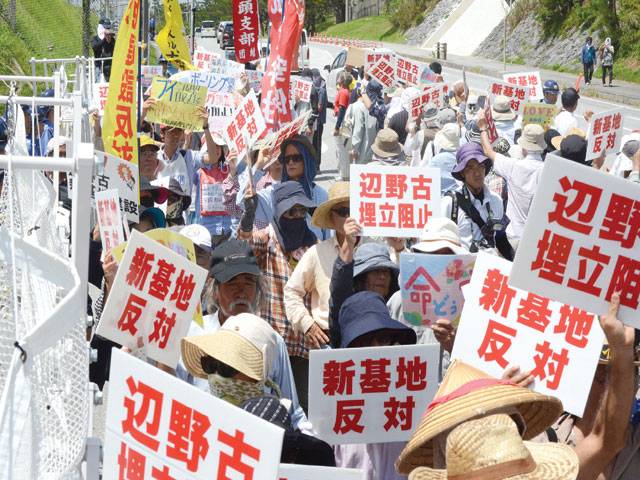TOKYO : Demonstrators rallied in Japan's southern Okinawa island chain Thursday, calling for work to stop on the long-stalled relocation of a controversial US military base.
About 200 protesters shouted and held placards that read "no new base" outside Camp Schwab, where workers started on the first phase of plans to build new runways for military planes - part of a wider relocation that is expected to take about five years.
Television footage showed yellow buoys being placed in the water to designate off-limit zones ahead of drilling surveys planned for next week, despite widespread objections from many Okinawans who bristle at the heavy US military presence.
"We are extremely angry about this work, which tramples on the feelings of Okinawan people," Hiroshi Ashitomi, a protest organiser, told AFP by telephone. "We will continue our protest until they stop construction," he added.
Coastguard ships were deployed to the area as small boats filled with protestors approached the site. There were no immediate reports of arrests or injuries.
Hosting the bulk of some 47,000 US service personnel in Japan, the strategically situated island chain is a crucial part of the US-Japan security alliance amid simmering tensions in East Asia, but there is widespread local hostility to the military presence.
Local media reported Thursday that Japan had paid some 380 million yen ($3.7 million) over the past decade in compensation for accidents caused by US military personnel or civilian employees.
The payouts, which mostly cover road traffic accidents but also include robberies and rapes, will likely further fuel public resentment of what is perceived as the imbalanced nature of the military relationship between the US and Japan that dates back to 1960.
The expansion of Camp Schwab is part of a long-delayed plan to move the US Marines' Futenma Air Station from a crowded urban area of Okinawa to sparsely populated Nago Bay.
Some personnel would move to Camp Schwab while others would be shifted to different military bases in Japan and abroad.
Tokyo and Washington agreed on the move back in 1996, but the deal never went ahead because of opposition from Okinawan residents.
In December, local officials approved a scheme that could accommodate the new facilities at Camp Schwab in exchange for a huge development package from Tokyo to boost the local economy, which is heavily reliant on tourism.
Susumu Inamine, re-elected in January as Nago mayor on a fiercely anti-base platform, said he was "infuriated" at the work that started on Thursday.
"We strongly protest this outrageous move by the Japanese government and are determined to block any construction of a new base," he said in a statement.
The local mayor does not have power to stop the base expansion, but he could theoretically block access to local roads and other facilities key to the work.
Friday, April 19, 2024
Protests call for end to US mily base move in Japan

Caption: Protests call for end to US mily base move in Japan
Mehwish Hayat says she would like to work with Aamir Khan
9:59 PM | April 18, 2024
'That'll be awesome,' Rohit Sharma on idea of Pakistan vs India Test series
9:17 PM | April 18, 2024
Turkiye commends Pakistan's efforts in fostering regional peace
9:03 PM | April 18, 2024
CM Maryam's security squad hits biker to death in Narowal
9:02 PM | April 18, 2024
Hafiz Naeemur Rehman sworn in as new emir of Jamaat-e-Islami
8:54 PM | April 18, 2024
Hepatitis Challenge
April 18, 2024
IMF Predictions
April 18, 2024
Wheat War
April 18, 2024
Rail Revival
April 17, 2024
Addressing Climate Change
April 17, 2024
Justice denied
April 18, 2024
AI dilemmas unveiled
April 18, 2024
Tax tangle
April 18, 2024
Workforce inequality
April 17, 2024
New partnerships
April 17, 2024
ePaper - Nawaiwaqt
Advertisement
Nawaiwaqt Group | Copyright © 2024





